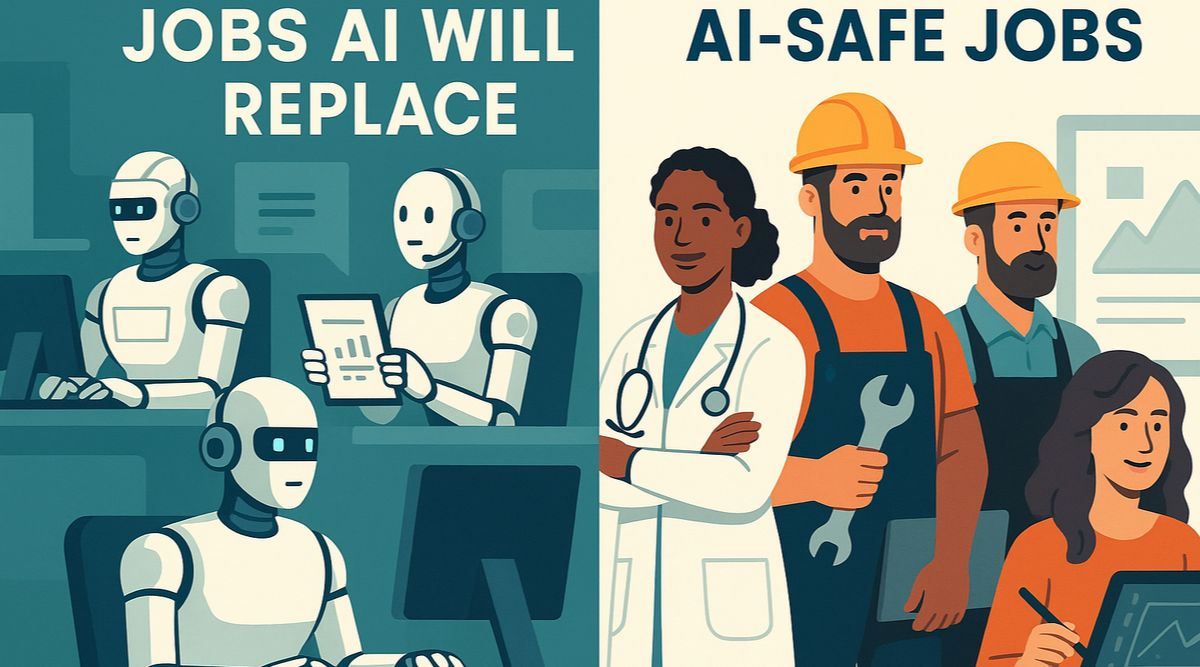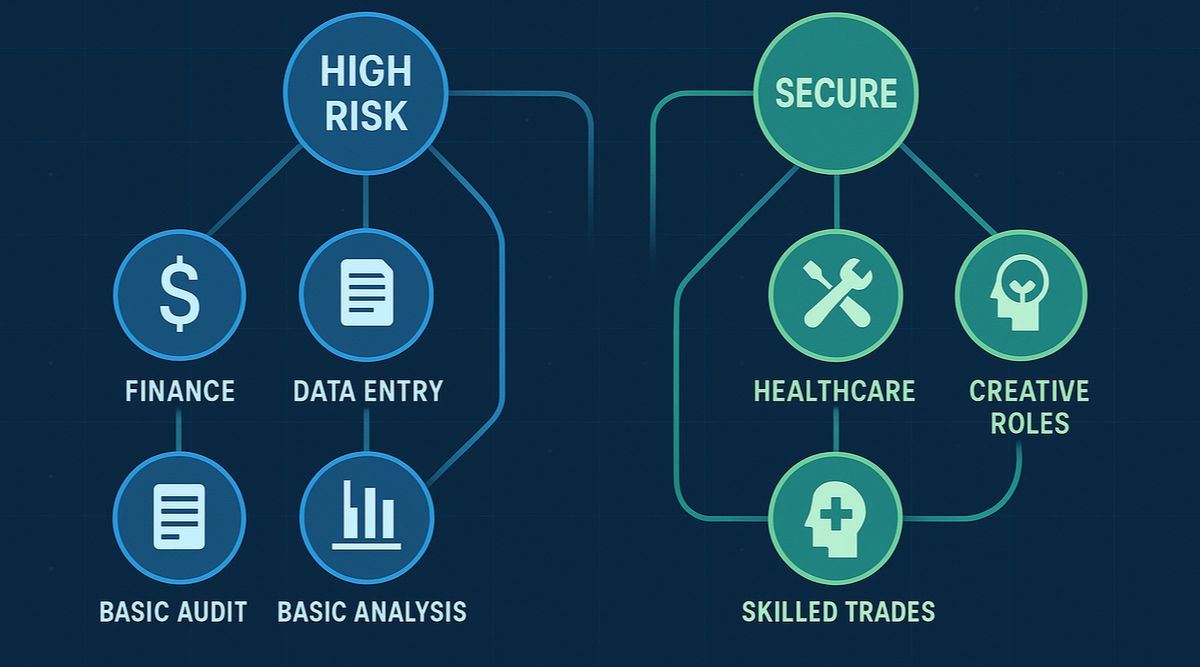What Jobs Will AI Replace? The Complete Guide to AI-Safe Careers in 2025. The rise of artificial intelligence has sparked widespread concern about job displacement, with many workers wondering which jobs will AI replace in the coming years. Recent MIT research from September 2025 reveals a nuanced reality: AI is predominantly replacing outsourced, offshore workers first, while domestic job displacement remains limited in the short term. However, Anthropic CEO Dario Amodei recently warned that nearly half of all entry-level white-collar jobs could be eliminated within five years, highlighting AI’s accelerating impact.
Jobs Will AI Replace 2025
The recent MIT’s State of AI in Business 2025 report reveals that only 3% of jobs could be replaced by AI in the short term, though nearly 27% face longer-term displacement risk. Crucially, AI is currently “replacing BPOs [business process outsourcing] and external agencies, not cutting internal staff,” according to MIT researchers.Will artificial intelligence affect
However, the impact is accelerating among specific demographics. A Stanford study shows AI adoption has been linked to a 13% decline in jobs for young U.S. workers, as AI can more easily replace “codified knowledge” from formal education than experience-based expertise. In 2025 alone, 77,999 tech jobs have been directly attributed to AI displacement across 342 companies.
Which Jobs Will AI Replace First?
According to Goldman Sachs research, AI could replace the equivalent of 300 million full-time jobs, with the most vulnerable positions sharing common characteristics. The Jobs Will AI Replace most quickly typically involve repetitive tasks, data processing, and routine decision-making. Artificial intelligence AI
High-Risk Positions for AI Replacement
Customer Service Representatives face the highest immediate risk, with 80% of customer service roles projected to be automated by 2025. IBM’s AskHR system already handles 11.5 million interactions annually with minimal human oversight, while AI chatbots are expected to save businesses $8 billion annually in operational costs.
Financial Analysts and Credit Analysts are particularly vulnerable. The U.S. Bureau of Labour Statistics reports that credit analysts are likely to see decreasing employment demand, with their employment projected to decline 3.9 per cent from 2023 to 2033 due to AI’s ability to synthesise financial data and generate credit reports.
Data Entry and Administrative Roles face near-complete automation, with manual data entry clerks facing a 95% risk of replacement. AI systems can process over 1,000 documents per hour with less than 0.1% error rates, compared to 2-5% human error rates. By 2027, AI automation could eliminate 7.5 million data entry and administrative jobs.
Worker Anxiety Reaches Critical Levels
Current surveys show 30% of U.S. workers fear their job will be replaced by AI or similar technology by 2025, with younger workers showing heightened concern. Workers aged 18–24 are 129% more likely than those over 65 to worry AI will make their job obsolete, while 49% of Gen Z job seekers believe AI has reduced the value of their college education.
Market Research Analysts face substantial displacement, with Bloomberg research indicating that AI could replace 53% of market research analyst tasks, compared to only 9% for their managerial counterparts.
 Jobs That Are Safe from AI Replacement
Jobs That Are Safe from AI Replacement
While automation threatens many positions, certain jobs will AI can replace in scenarios are unlikely due to human-specific requirements. The most secure positions involve creativity, emotional intelligence, and complex problem-solving.
Healthcare Professionals Lead AI-Resistant Careers
Healthcare roles demonstrate remarkable resilience against automation. Nurse practitioners are projected to grow by 52% from 2023 to 2033, much faster than the average for all occupations. These positions require empathy, critical thinking, and adaptability that AI cannot replicate.
Physical Therapists, Occupational Therapists, and Mental Health Counsellors remain highly secure because they involve direct human interaction, emotional support, and personalised care plans that require human judgment.
Skilled Trades and Manual Labour
Construction and skilled trades are among the least threatened by AI automation. Jobs like electricians, plumbers, HVAC technicians, and carpenters require hands-on problem-solving, spatial reasoning, and adaptability to unique situations.
Creative and Strategic Roles
Artists, Writers, and Creative Directors face an interesting paradox. While AI can generate content, truly innovative and strategic creative work requires human intuition, cultural understanding, and emotional depth that remains distinctly human.
The AI Job Creation Phenomenon
Understanding which jobs will AI replace requires recognising that technology also creates new opportunities. AI and data science specialists are among the fastest-growing job categories in 2025.
Emerging AI-Related Careers
AI Specialists and Machine Learning Engineers represent the fastest-growing segment. Software developers are projected to see a 17.9% increase in employment from 2023 to 2033, driven by AI implementation needs.
Cybersecurity Professionals benefit from AI adoption, with a 32% growth in information security analyst jobs from 2022 to 2032, as organisations need protection against AI-powered threats.
Industry-Specific AI Impact
Different sectors face varying levels of disruption when considering which jobs will AI replace:
Finance Sector Transformation
The financial industry experiences rapid AI integration. Personal financial advisors have already begun to see job competition from AI through app-based “robo-advisors”, yet demand for human advisors remains strong due to complex client needs.
Manufacturing and Transportation
MIT research shows AI will replace 2 million manufacturing workers by 2025, particularly in assembly and quality control roles. Transportation faces similar pressures with autonomous vehicle development.
Education and Professional Services
Jobs Will AI Replace: Rather than wholesale replacement, AI transforms how educators and professionals work. Translators and interpreters, who have used AI for years, have become more productive because they can focus on higher-level tasks.
Future-Proofing Your Career
To navigate the question of which jobs will AI replace, workers should focus on developing uniquely human skills:
- Emotional Intelligence: Building strong interpersonal relationships and understanding human emotions
- Creative Problem-Solving: Thinking outside conventional patterns
- Strategic Thinking: Understanding broader contexts and implications
- Adaptability: Continuously learning and adjusting to new technologies
Government Response and Worker Protection
Jobs Will AI Replace: The U.S. Bureau of Labour Statistics is actively incorporating AI-related impacts into its employment projections, helping policymakers understand workforce transitions. The World Economic Forum’s Future of Jobs Report 2025 reveals that 40% of employers expect to reduce their workforce where AI can automate tasks, highlighting the need for proactive retraining programs.
Conclusion: Adapting to AI’s Impact
While the question of which jobs will AI replace generates anxiety, history shows that technological revolutions create as many opportunities as they eliminate. The key lies in understanding AI’s limitations, developing complementary skills, and staying adaptable in an evolving job market.
Workers who embrace continuous learning, focus on uniquely human capabilities, and understand how to collaborate with AI systems will find themselves not just surviving but thriving in the AI-powered economy of tomorrow.


 Jobs That Are Safe from AI Replacement
Jobs That Are Safe from AI Replacement